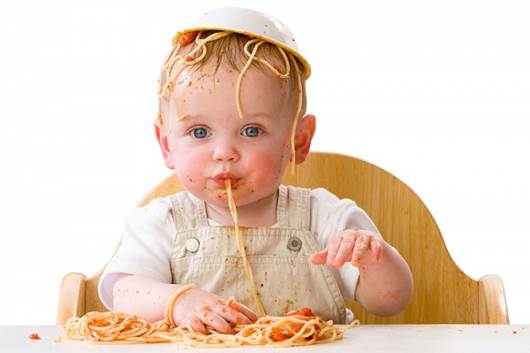Trying to make children eat as much as
possible, letting children eat snack all day, feeding them while they can eat
the food themselves… are reasons why children refuse to eat.
Parents who have children around 1-5 years
old often complain about their children refuse to eat. Children can look like
they don’t eat enough, never feel hungry or eat except they do it themselves.
As long as children develop normally, their laziness of eating shouldn’t be a
concern.

Parents
who have children around 1-5 years old often complain about their children
refuse to eat.
Reasons why children lose appetite
Children can increase 6.8kg in the first
year of their life. From 1 to 5 years old, children often increase 1.8 to 2.2
kg a year. Children at these ages are considered to be normal when they don’t
increase any weight in 3-4 month period of time. That’s because children don’t
growth fast, they need little energy and seem to not have appetite, which is
called physiological anorexia. The amount of food that children choose to eat
is controlled by the appetite center in the brain. Children eat as much as they
need for their growths and activities.
Many parents try to make their children eat
much food than they need because they are afraid of the fact that the appetite
loss can bring bad health and nutritional deficiency to their children. This is
not right. And, the more you make them to eat, the less they want to eat.
How long does the appetite loss last?
When you allow your children to choose
foods they want to eat, the discomfort about eating and your worries about
their health issues will be gone in the next 2-4 weeks. Their appetite will be
improved when they grow older.
What can you do for your children?

Let
children decide the amount of foods they want to eat.
Let children decide the amount of foods
they want to eat.
Believe in children’s appetite center in
the brain. Children will eat as much food as they need. Their brain will make
sure that they have enough energy to maintain the activities and developments.
Provide children with balanced meals. If
children feel hungry, let them eat. If they don’t, they’ll eat more in the next
meal. Reminding them to eat or making them to do it can even make them fight
back.
Let children have a light meal between the
main ones. The most popular reason making children not feel hungry is that they
eat too much snacks. Let children have main meals with their empty stomachs by
not letting them have more than 2 light meals with nutritional foods a day. The
light meals should be 1 third as much as the main ones.
When children feel thirsty when eating, let
them drink water. Limit the amount of juice that they have a day by 178ml. You
can let them skip the light meals if they want to. Children can even have no
harm form skipping some meals.
Do not feed them when they are able to eat by themselves.
Parents who have children that lose
appetite tend to make their children fed. However, you should never feed them
when they are old enough to use spoons (usually 12-15 months old). If your
children are hungry, they will eat on their own. Making children eat is the
main reason starting eating battles.

Eating
with hands can be started when children are 6-8 months old.
Let children eat by using their hands and
grab the foods more often. Eating with hands can be started when children are
6-8 months old. That method can help children eat by themselves despite the
fact that they don’t know how to use spoons.
Limit the amount of milk the children drink
to 480ml a day. Milk contains lots of energy that is as much as weans. Drinking
too much milk or juice can make children full and lose appetite.
Create a comfortable atmosphere when
eating. Lead children to happy talks during meals. Prevent making the meal time
battle time with criticisms, shouts and duress.
Avoid talking about children’s eating. Do
not argue with them about how much food they eat less than other people.
Similarly, do not praise children when they eat much. Children should eat for
themselves, not for the pleasures of their parents.
Do not prolong the meal. Don’t make your
children to sit at the dinner table after every member in the family finish the
food. That only makes them feel more uncomfortable about meals.
Some popular mistakes when taking care of children’s
eating

The
worries of parents about their children don’t eat enough can lead them to
inappropriate feeding methods.
The worries of parents about their children
don’t eat enough can lead them to inappropriate feeding methods. Some people
wake their children at the middle of the night just to make them eat. Some feed
their children each hour for the whole day. Some allow their children to have more
snack than the main meals.
There’re many women try to make children
feel guilty when the children don’t eat by talking about the starved children
around the world. Some moms threat their children: “If you don’t eat my foods,
you don’t love me”. Some parents make their children stay at the dinner table
for too long. The most popular mistake is trying every ways to wile children to
open their mouth so that parents can put the spoon full of food in it.
How to prevent eating battles?
The most way to prevent eating battles is
to teach children to be independence of eating. At the time they are 6-8 months
old, you should let them eat food with their hands. At 12 months old, you
should let them use spoons so that they can eat foods with spoons when they are
15 months old.